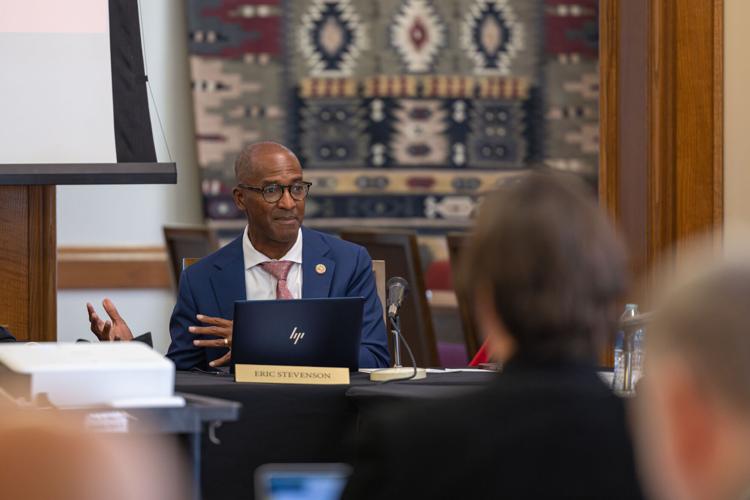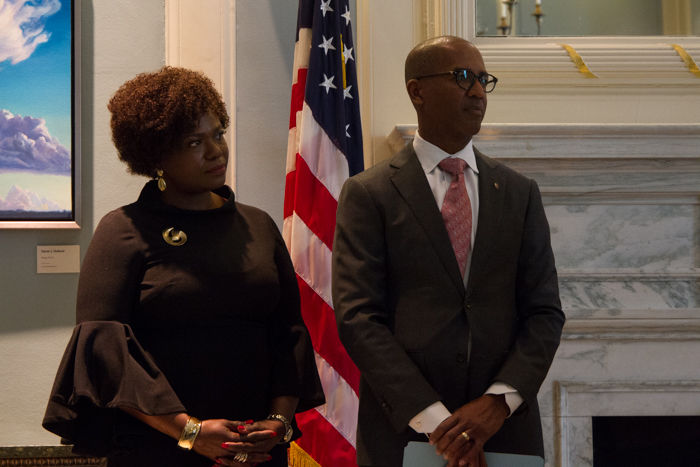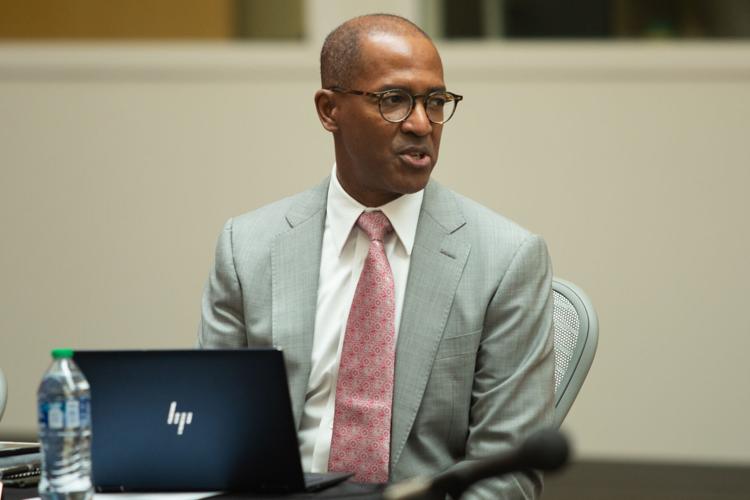This story is part of OU Daily’s summer magazine. This publication will be available in mid-April on racks around campus and online at oudaily.com.
Ever since he was a child, Eric Stevenson had an entrepreneurial spirit.
He would try to make money by mowing lawns and assisting neighbors with random tasks.
Stevenson’s interest in business differed from his family who primarily practiced medicine.
“I never thought I was going to be an engineer or a doctor or any of that. I've always just known business was my path,” Stevenson said.
With just over 6,000 residents in Wagoner, a little over 140 teenagers graduated from Wagoner High School in 1980. As he exited high school, Stevenson wasted no time in becoming acclimated with his future alma mater. That summer, he enrolled in classes at OU and took up a job in the OU office of foreign affairs, now known as International Student Services.
Stevenson attended OU from 1981 to 1985, earning a bachelor’s in business administration in finance. He knew early on that he wanted to pursue a career in accounting or finance but was unsure of what area of business he wanted to specialize in.
Since he was a child, Stevenson would jump at the opportunity to lead with no hesitation, a spirit he now embodies as he takes the helm of the OU Board of Regents.
When Gov. Kevin Stitt appointed Stevenson to serve as a regent in 2019, he became the first Black regent in 20 years to serve on the board. In April 1992, Melvin Hall and Ada Lois Sipuel Fisher were appointed to the board on the same day, with Hall later becoming the first and, until now, only Black chair of the OU Board of Regents, stepping down from the board in 1999.
In March, Stevenson was appointed as chair of the OU Board of Regents, where he will be leading the university as it transitions to the Southeastern Conference; enters a new age of strict diversity, equity and inclusion guidelines; and strives to close out a $2 billion fundraising campaign to bring more financial stability to the university.
As he does this, Stevenson hopes to bring the spirit he’s had since he was a child in order to make sure OU is successful as it undergoes several changes.

Regent Eric Stevenson during the OU Board of Regents meeting at the Stephenson Research and Technology Center Atrium on March 7.
Business aspirations
When Stevenson attended OU, the Price College of Business was yet to be renamed from the College of Business Administration, and Price Hall hadn’t been built.
Steve Cesler, business practitioner for Procter and Gamble, gave a lecture in one of Stevenson’s marketing classes, piquing his interest in brand management. Brand management is a part of marketing that works to improve the perception of brands and their products.
Stevenson obtained a summer internship at Procter and Gamble in Dallas, where he immediately fell in love with the marketing side of business.
From then on, Stevenson made an action plan for how he would succeed in the field. If he wanted to work in marketing at top companies such as Procter and Gamble, he knew he needed to earn a master’s degree from a top-tier business school. Stevenson set his eyes on Northwestern University’s Kellogg School of Management, but he needed to bolster his resume before being admitted into the graduate business program.
After graduating from OU, Stevenson worked in sales at Xerox until he was admitted into Northwestern in 1991. He earned his master’s in 1993 and continued pursuing his passion in business.
Stevenson currently lives in Ohio where he is the president of Nationwide Retirement Solutions. Stevenson began working with Nationwide in 2006. He previously served as senior vice president of Nationwide retirement plans distribution and was a significant contributor in growing the retirement plans operation to over $175 billion in assets.
According to his wife, Davia, Stevenson was dedicated to building up his community when they moved to Columbus, Ohio. The two of them established a restaurant, and Stevenson took it upon himself to tour the neighborhood looking for property he could purchase and use to improve the community.
“I mentioned, everything is done in groups. If you don't have any work experience, you don't have anything to contribute to the group,” Stevenson said.
Stevenson’s friends described him as strategic in his approach to business and other avenues of life. Stevenson said his experience of working in marketing while juggling being a father has prepared him for the leadership positions that he seeks today.
“The community that I built at OU is amazing. I've talked about the whole experience. The whole experience changed my life. The friends, the challenges that you have, the obstacles that you run into as (a resident adviser), the fraternity, the internships, all of that is what helped me to grow up,” Stevenson said.
OU holds a special place in Stevenson's heart.
It was at OU where Stevenson met his wife and close friends Todd Chandler and Sherad Cravens. Davia and Cravens had gone to the same high school and were friends before meeting Stevenson. Stevenson and Davia met in their freshman year and dated throughout college before getting married in 1987.

OU Regent Eric Stevenson and his wife Davia Stevenson at a press conference at the Oklahoma City Capitol March 1.
The couple has two sons named Eric and Tyler, and a granddaughter named Serenity.
In the early parts of their relationship, Davia was undergoing chemotherapy after being diagnosed with cancer her senior year of high school.
“He just made it safe, and he celebrated who I was because I came back looking different sophomore year than I started freshman year,” Davia told OU Daily. “You’d have thought I was the trendsetter the way he hyped me up. I think it was then that I was convinced that this was my dude.”
Cravens, an instructor of marketing and supply chain management at OU, became friends with Stevenson in the summer of 1980 and they have remained close ever since. After the two hit it off, they were dead set on becoming roommates.
The problem was the dorm that Cravens originally planned on residing in, Walker Tower, didn’t have room for Stevenson. Cravens ended up sacrificing what he described as the equivalent of Cross Village at the time to room with Stevenson at Cate Center, which didn’t have air conditioning.
Cravens described Stevenson as a persuasive leader who was easy to follow, even during his time in undergrad.
“I think one of the reasons he's an excellent leader is he kind of has the savvy way of taking you where he wants you to go,” Cravens said. “He's encouraged me to do something that I haven't wanted to do. But he has encouraged me to do things I wouldn't have thought about doing.”
While at OU, Stevenson became president of the Alpha Phi Alpha, a historically Black fraternity, which Cravens had also pledged. The Black student population at OU was strong during the 1980s, and that was in part due to Stevenson helping foster the community.
“It was like we had our own (historically Black college or university), and in some way it fortified us to have competence to navigate the larger university,” Davia said. “I don't recall, honestly, any overt difficulties around race.”
Cravens said he and Stevenson have managed to keep their friendship strong post-OU despite living in two different states.
Stevenson accompanied Cravens when he learned he had prostate cancer. Cravens said Stevenson has been checking in on his progress to show support as he battles through the illness.
“It's been an amazing friendship,” Cravens said. “He's been there for me. Hopefully he's gotten the same support from me that I've received from him and his wife.”
Stevenson reconnected with OU in 2014 after Daniel Pullin, former dean of Price College, approached him about joining the Price College Advisory Board, composed of Price College alums who offer assistance and insights on how the college functions.
Four years later, Stevenson was appointed to the OU Board of Regents, the governing body of OU, Cameron University and Rogers State University. Seven regents appointed by the governor serve on the board, headed by a chair. Each regent serves a seven-year term, while chairs serve for a year at a time. Stevenson is in his fifth year on the board.
“I think he saw the opportunity to serve a place that means a lot to him and certainly means a lot to me as well.” Davia said.

Gov. Kevin Stitt announces the appointment of Eric Stevenson to the OU Board of Regents March 1. Stevenson, third from the left in the photo, is an OU graduate who previously worked in an executive position at Nationwide Financial.
Stevenson and Stitt
As Stevenson steps into his role as chair, he is watching the university transition due to Stitt’s December executive order requiring universities to formally review diversity, equity and inclusion within their institutions.
In February, OU responded by restructuring its Office of Diversity, Equity and Inclusion to the Division of Access and Opportunity. OU President Joseph Harroz Jr. later reaffirmed that no one would lose their employment with the university due to the executive order. On April 4, a sign on the front doors to the division in Copeland Hall announced the offices would be closed to the public.
Throughout his life, Stevenson has been consistent in funding and leading minority-based organizations and supporting candidates who champion diversity, despite working in conjunction with politicians and leaders who may not hold the same beliefs.
Cravens said a valuable skill he and Stevenson learned in their time at OU was how to effectively navigate predominately white spaces, something they would both take with them as they transitioned into graduate school and eventually the workforce.
“You learn how to not just survive, but to survive and thrive,” Cravens said. “How to develop … relationships and where to give and not to give.”
Stevenson told OU Daily that with these transitions come changes that he is excited about, such as the new shape the Division of Access and Opportunity will take.
“I feel like we're on an incredible run, and I feel like it's all before us. And any student, Black, white, Native American, any student that applies OU (who) is admitted, we will make sure they have the money to go there and to succeed,” Stevenson said. “I love the new name.”
Regarding how students may feel with Stitt’s executive order looming, Stevenson said OU is handling the situation as well as any other institution could.
Stevenson expressed the importance of maintaining scholarships and cited Harroz's frequent discussions on ensuring financial support for admitted students. Stevenson said a major goal for the board is to continue increasing enrollment and stressed the importance of students graduating and increasing their chances to improve their lives.
Stitt’s executive order stands in direct contrast with what Stevenson has chosen to support politically despite being appointed by Stitt to the OU Board of Regents.
Since Stevenson was appointed, he has donated $2,800 to one Democratic candidate, and a total of $1,250 to two Republican candidates.
His donation of $2,800 was made to U.S. Rep. Joyce Beatty (OH-3) in 2020. Beatty was elected 27th chair of the Congressional Black Caucus the same year.
Stevenson donated $25,000 to President Joe Biden’s Unite the Country super PAC and $5,000 to the Congressional Black Caucus PAC in 2020.
In contrast, Stitt has voiced public support for former President Donald Trump and was endorsed by him when he made his first bid for governor in 2018. Stitt recently re-endorsed Trump after Florida Gov. Ron DeSantis dropped out of the presidential race in January. Stitt said that Trump is the right person for the job and that the world was safer with him in power instead of Biden.
During the contentious 2020 election year, Trump signed an executive order threatening DEI in the workplace. Since Trump lost his bid for reelection to Biden, DeSantis has taken the spotlight as the main proponent against DEI.
In his time as Florida governor, DeSantis has persistently pushed legislation attacking DEI in both public universities and K-12 schools. He signed the “Don’t Say Gay” bill and has run his presidential campaign on the idea that “wokeness” is infringing on American Democracy.
DeSantis signed his bill banning DEI in May of 2023. One month later, he visited Oklahoma where Stitt made his formal endorsement.
“As far as protecting our kids in school, the DEI, and the things that we're doing in Oklahoma, I'm copying a lot of the stuff that DeSantis does,” Stitt said in Iowa with DeSantis. “He’ll tell you all about that.”
The candidates with which both Stevenson and Stitt have chosen to associate and support themselves stand in direct contrast with one another.
When analyzing each regent's political donations, John R. Braught and Stevenson stand out as the only regents to have never made a donation to Stitt.
As a result, OU students will endure a year in which the chair of the Board of Regents and the governor of Oklahoma are opposed in beliefs regarding diversity and inclusion and other political ideologies.
Despite these differences in political beliefs, members of the OU Board of Regents are excited for Stevenson to take the helm as chair. Regent Rick Nagel, who has previously supplied money to Stitt and Trump, voiced his support for Stevenson as chair.
“He's got an incredible passion for the university. He has a strong history of supporting, particularly our business school,” Nagel said. “He's a visionary. He understands what it takes to execute, and I think there are no limits for regent Stevenson in charge.”
Stevenson, who has not shied away from showing his political ideologies through his donations, will have to work with people he might disagree with, something Cravens said is learned as a person of color in the South.
“Because we grew up in the South and in states like Oklahoma and Texas, we learned what to watch out for, and we learned how to survive,” Cravens said. “And you learned that every one that appears to be your friend might not be your friend.”
Harroz’s relationship with the OU Board of Regents is pivotal, not only as the university enters an evolving age of DEI, but also as higher education across the country grapples with disruption.

OU President Joseph Harroz Jr. and OU Board of Regents vice chair Eric Stevenson during the Board of Regents meeting on March 12.
Harroz and the board are planning to apply pressure by ensuring OU is a desirable place for new students, especially as the value of a college degree has been called into question amid the predicted enrollment curve.
OU is also undergoing a transition into the SEC and is currently working through the logistics of how athletes can make money, whether it be strictly through “name, image and likeness” or direct funds from universities.
Harroz said in a time of disruption in higher education, the Board of Regents has been “exceptional” in how they are navigating these changing times.
“This board is as good as I've ever seen. They're really engaged. They know it is a time of real, real disruption in higher education,” Harroz told OU Daily in a sit-down interview on April 3. “I couldn't have more respect for Eric Stevenson and for the board itself, and I think that's one of the reasons that we're in a really good position right now.”
Other than Stevenson, the board currently includes Vice Chair Anita Holloway, former chair Natalie Shirley and regents Nagel, Braught and Bob J. Ross.
Stevenson said the board is united in making sure Harroz is provided with everything he needs to effectively govern the university in a manner that benefits all its students.
“That's part of the work of regents, just to make sure that the president has what he needs to be successful, whether it's staffing or direction, or he tells us what's important in terms of funding,” Stevenson said.
As a former OU student and current board member, Stevenson said he wanted to serve as an example of someone who gives back to his community and as a representative of Wagoner. Staying true to his roots has motivated Stevenson to invest in helping both OU and Price College thrive, such as by supporting a scholarship program to assist students who struggle to afford college.
As Stevenson takes on this new role, he’s excited to foster an engaging and encouraging environment on campus.
“What I believe university and college does for people is that it opens your aperture, you get exposed to differences, you get exposed to different cultures, to different foods, to different experiences, to different religions and faith,” Stevenson said. “All of that happens at the university, typically in a pretty safe environment, and that's why I say I think we are doing it better than most.”
Read more from summer magazine:
This story was edited by Anusha Fathepure, Peggy Dodd and Karoline Leonard. Ryan Little, Avery Avery, Mary Ann Livingood and Nikkie Aisha copy edited this story.










